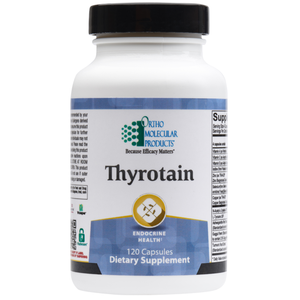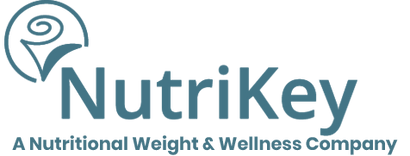
Thyrotain, 120 Capsules
DESCRIPTION
Thyrotain is a comprehensive formulation that provides a blend of nutrients and botanicals working in synergy to support thyroid health. Thyrotain includes L-tyrosine and iodine, which make up the backbone of the thyroid hormones thyroxine (T4) and triiodothyronine (T3). The addition of zinc, copper, selenium, vitamin A, and the botanical guggulipid activate enzymes that enhance the conversion of T4 into the active thyroid hormone T3. Vitamin A and zinc also help improve cellular sensitivity to thyroid hormones. Turmeric, along with the antioxidants vitamin C and E and N-acetyl cysteine (NAC), provide a powerful combination of antioxidants that boost thyroid health by reducing free radical stress.
Formulated to be free of allergens derived from: Gluten, corn, yeast, artificial colors and flavors.
DIRECTIONS
Serving Size 4 Capsules
Servings Per Container 30
Suggested Use: 4 capsules per day or as recommended by your health care professional.
Warning: Do not consume this product if you are pregnant or nursing. Consult your physician for further information.
Storage: Keep container tightly closed. Store at room temperature. Keep out of reach of children.
LEARN MORE
The thyroid gland, located in the neck below the Adam’s apple, produces T4 and T3 hormones that regulate cell metabolism. In this process, thyroxine is converted into the metabolically active hormone T3. Thyroid hormones are required for mitochondrial metabolism in every cell in the body. Therefore, a deficiency of thyroid hormones can affect virtually all bodily functions, including metabolic rate, reproduction, hormone production, and brain function, as well as musculoskeletal, psychological and cardiovascular health.
Lifestyle factors, environmental toxins and nutrient deficiencies can negatively impact thyroid hormone production. A number of nutrients are required to produce thyroid hormones and to help convert T4 into T3. These nutrients include L-tyrosine, iodine, selenium, zinc and vitamin A. A deficiency in any of these nutrients can cause the thyroid to under-function. Heavy metals, such as mercury, lead and cadmium, as well as other chemical contaminants, can also block the conversion of T4 to T3. In addition, long-term stress can lead to increased production of the adrenal hormone cortisol. Excessive levels of cortisol can block the conversion of T4 to T3 and also increase the production of reverse T3 (RT3). RT3 is an isomer of triiodothyronine that competes with T3 at the receptor sites. Conversely, exercise positively impacts the thyroid gland by stimulating hormone secretion and increasing tissue sensitivity to thyroid hormones.
Statements contained herein have not been evaluated by the Food and Drug Administration. This product is not intended to diagnose, treat, cure, or prevent disease.






